Outgrowing Facebook Groups? Here are 10 better community platforms in 2025
What do Facebook Groups and large department stores have in common? Take a look at either one and you’ll see a lot of space and not much happening.
While department stores have lost out to e-commerce and specialty stores, Facebook Groups (and social media platforms in general) have continued to see a steep decline in engagement and reach.
Do a search or ask your favorite AI tool, and the numbers back up the gut feelings marketers have had for years. The average engagement rate on Facebook is 0.063%, and the average organic reach for content on the social network is 5.5%.
The reasons for these declines range from algorithm changes to a lack of monetization options (not to mention Meta shutting down your Group without warning). These factors and more are driving professional community builders to search for alternatives to Facebook Groups.
🔍 Where are these community builders moving?
Circle has helped more than 1,000+ community builders successfully move their communities from Facebook Groups.
But we’re not the only option out there (although we do think we’ve got a lot to offer). Here’s why those community builders chose Circle and nine other options you can consider.
Why professional community builders outgrow Facebook Groups
For many of us, Facebook was our first experience with an online community. We became hooked on the thrill of sharing our passions and discovering people around the world who shared the same feelings.
That feeling persisted, even as Facebook's evolved from a community-centric platform to one where profit often outweighs user experience and safety. Algorithms shifted, organic reach disappeared, and community builders found themselves working harder for less impact.
Circle takes the opposite approach. It’s built from the ground up to put the member experience first. From intuitive design to customizable spaces, Circle prioritizes meaningful connection, giving community builders complete control over how their members engage, grow, and thrive without competing against ads or shifting algorithms.
We’ve talked about why you should move your community off of Facebook grouops before, but here’s a quick recap:
Getting caught in the algorithm trap
As we mentioned earlier, organic reach and engagement on Facebook have been in a nosedive. The reason? Meta makes its money from ads and continually tweaks its algorithm to favour paid over organic content.
AI-generated content is making the problem even worse. Researchers at the Harvard Kennedy School of Government found that Facebook’s algorithm was putting AI-generated image posts into users’ Facebook Feeds even if they weren’t following those pages.
The lack of monetization options
You’re building a community and a business, but doing that with a Facebook Group is a challenge since you can’t monetize your expertise.
Unlike purpose-built community platforms, Facebook Groups does not offer community builders a way to provide membership tiers, export their members’ emails or data, or build sustainable business models around their communities. Even if they did, there is no native payment processing tool or an option to integrate a third-party payment tool, such as Stripe or Square.
You can certainly offer your members an external payment tool, but this introduces new points of friction for new registrations and renewals.
A shaky foundation for your community
The biggest challenge with building a community on Facebook Groups is that you’re at the mercy of Meta and its policies. You can be in their good graces one day and find yourself deplatformed the next.
🏚️ When you build a house on someone else’s land, it’s still their house.
The risks here are massive. Being deplatformed means losing your content and membership list, as well as any associated content information.
That’s not to mention the security risks that come with Facebook Groups. If your group is hacked, you’ll lose control of your community and content. Even worse, the hacker could do significant damage to your reputation and business.
Limited community experiences
Facebook Groups still sits inside the same news-feed experience that powers the rest of the platform. Aside from swapping the cover photo and toggling a few tabs, you have little say in how the space looks or behaves—or what other content is stealing their attention.
Evergreen resources sink under daily chatter, and you can pin only one post at a time, so key guides or FAQs are hard to keep in view. Want breakout rooms for beginners, power users or regional chapters? Your only option is to create separate groups and hope that members follow the links.
Day-to-day operations also feel dated. You can’t automate onboarding flows, tag members by interest or connect the group to your email list without clunky third-party workarounds. The result? A space that looks and acts like every other Facebook feed, rather than the structured, brand-owned hub that today’s community builders and their members expect.
What to look for in a professional community platform
So what should you keep an eye out for when you’re looking for alternatives to Facebook Groups?
If you’re a professional community builder, you’ll quickly run up against Facebook’s walls. But even if you’re just getting started, it’s worth thinking ahead to a platform that can scale with you.
We’re going to dig into ten alternatives, but remember the best ones offer what Facebook Groups can’t (by design):
- Provides a clean, distraction-free interface. Your members come to your community for content, not random posts fed by a black box algorithm. Look for alternatives that showcase your unique offering.
- Offers monetization tools. You’re building a business, so look for platforms that let you offer subscriptions, paid courses, digital products, events, and more.
- Makes content easy to find. Discovery is difficult (if not impossible) on Facebook Groups. Your alternative should have subgroups, private and public spaces, and ways to organize your information, like content libraries.
- Let you own and protect your data. When you build on Facebook Groups, Meta still owns your data. Choose an alternative that ensures your (and your members’) data remains yours, from member data to analytics.
- Gives members a great mobile experience. Your community wants to connect wherever they are. Platforms like Circle that offer native apps for iOS and Android deliver just that.
- Brand customization. This is the number one thing you’ll want to look for in Facebook Groups alternatives. Choose an alternative that lets you put your brand alongside your content to deliver a consistent experience for your community members.
The 10 best Facebook Groups alternatives
1. The best all-in-one platform for serious community builders: Circle
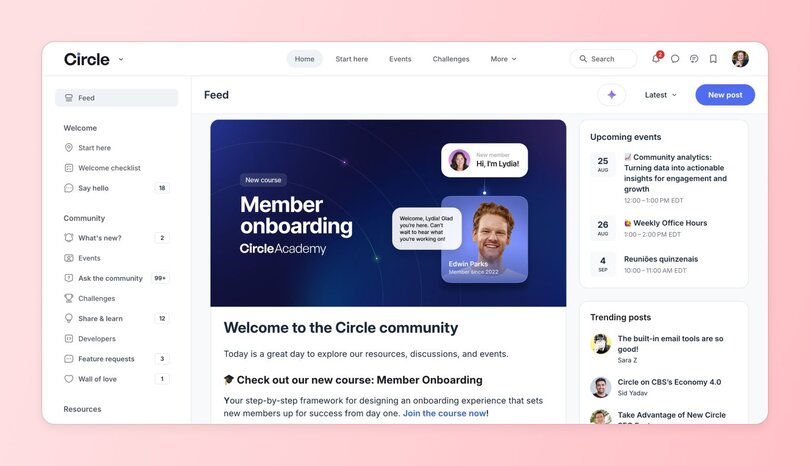
Circle is the best alternative to Facebook Groups, built for creators and brands that want a clean, branded home for their communities. But it goes further. With Circle, you can own your entire funnel from website to email to community, events, courses, and even digital products.
Instead of piecing together scattered tools, Circle gives you one connected platform where every step of your member journey lives under your brand. Organize conversations with spaces (not chaotic feeds), spotlight content with posts and collections, and keep momentum with events, DMs, and group chat. You own the experience and the data, with flexible memberships and paywalls to monetize on your terms. Plus, there’s no algorithm between you and your members.
Pricing:
Starting at $89/month with a 14-day free trial.
Perfect for:
Creators, coaches, and membership communities who want a best-in-class platform for their audiences—with room to grow.
What makes Circle different:
- Effortless Facebook Groups migration. Depending on your plan and assets, our team can handle the entire transition—member import, content, course, and payment transfers, and concierge setup.
- Immediate monetization. Start earning revenue on day one with paid memberships, courses, and events.
- Superior member experience. A distraction-free environment so your users can focus on connecting, learning, and growing.
- Complete data ownership. Download member lists, analytics, and content anytime.
- Professional branding. Custom domains, branded mobile apps, and white-label options.
Ready to make the switch? Book a free migration consultation and see how Circle can transform your Facebook Group into a thriving, profitable community.
For example, here’s why the founder of Your Soulcialmate, Kristen Bousquet, moved her entire membership business off Facebook Groups:
- Chaotic and disorganized: "It was just very chaotic and disorganized," and she "could never find what I was looking for" as a Type A person
- No onboarding process: "It really was just a free-for-all where anyone could come in" with no way to understand who members were or what help they needed
- Not professional enough to charge for: "The space didn't feel professional enough for it to be a paid product."
- Couldn't justify monthly value: "On a Facebook group, I definitely don't think I could have done this" in terms of creating something "worth it every single month"
Start your free 14-day trial of Circle & get migration support today.
2. The budget-friendly option: Mighty Networks
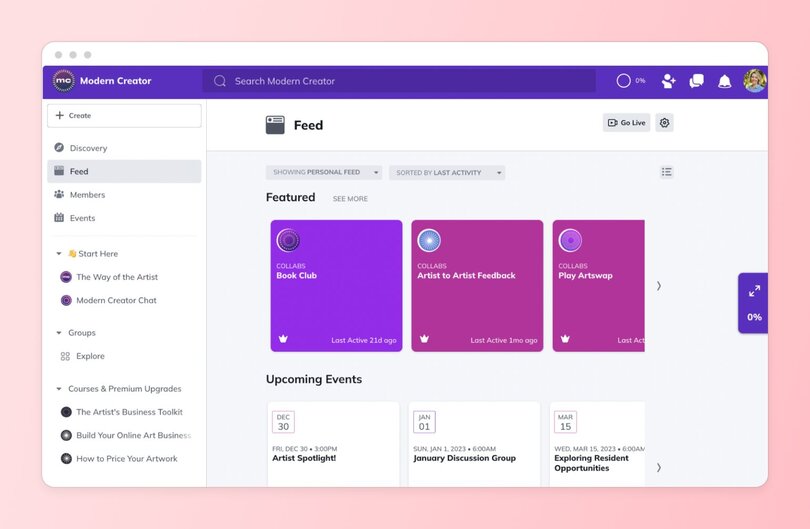
Mighty Networks is an alternative to Facebook Groups, offering a single, branded hub to host your community, courses, and events, complete with member profiles and topics that spark peer-to-peer discovery.
Pricing:
Plans with basic community features start at $39/month.
Perfect for:
Educators and course creators who want to wrap courses, discussions and events into one learning hub.
What makes Mighty Networks different:
- Create lessons and track member progress without juggling third-party tools.
- Run cohort-based sprints, live workshops or community challenges that keep learners moving together.
- Sell memberships, premium courses or one-off events with a built-in, native checkout process.
- Members get a dedicated iOS and Android app.
- Organize posts, videos, and resources by topic so that important material never gets lost in the feed.
3. The best for gamified learning (not flexibility): Skool
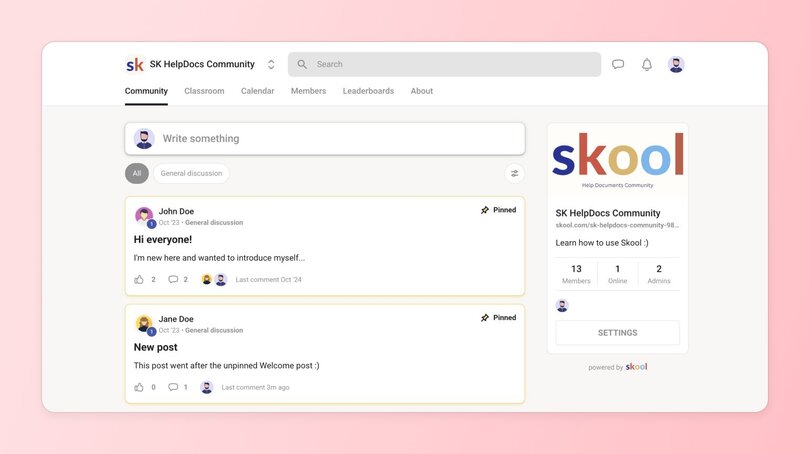
Skool combines online courses, discussion forums, and gamification into a single community platform. It’s easy to set up, but it’s missing some customization and branding tools, as well as integration options.
Pricing:
Flat rate of $9 or $99 /month with a 14-day free trial.
Perfect for:
Coaches and course creators who want a straightforward platform without a ton of bells and whistles.
What makes Skool different:
- Built-in points, badges and leaderboards to keep learners engaged.
- Unlimited courses inside each group, plus drip scheduling and progress tracking.
- Clean, Facebook-style feed that cuts out ads and distractions.
- One-click community challenges to spark participation.
- Stripe payments are built-in, with a 2.9% processing fee so that you can charge from day one.
4. The best for free, live chat (not structure): Discord
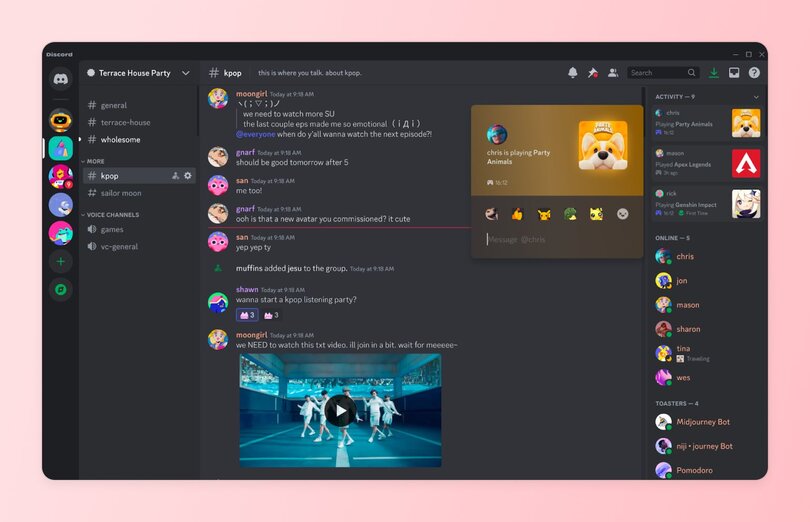
Discord is real-time chat on turbo boost. Originally built for gamers, the platform has text, voice, and stage channels that drive live, fast-moving conversations. Downsides: chaos scales quickly, long-form content gets buried (due to lack of content organization), and there’s no native monetization.
Pricing:
Free for users and server owners. Users can purchase Nitro Basic ($2.99/month) or Nitro ($9.99/month) upgrades for animated avatars and other features.
Perfect for:
Gamers, hobby groups, or any community that needs always-on voice and video chat.
What makes Discord different:
- Persistent voice and stage channels for real-time conversation.
- Granular server layout with text, audio and forum-style channels.
- Thousands of third-party bots for moderation, events and automation.
- Screen sharing and low-latency streaming up to 4 K (Nitro).
- Supports up to 250,000 members per server.
5. The best for reach (not ownership): Reddit
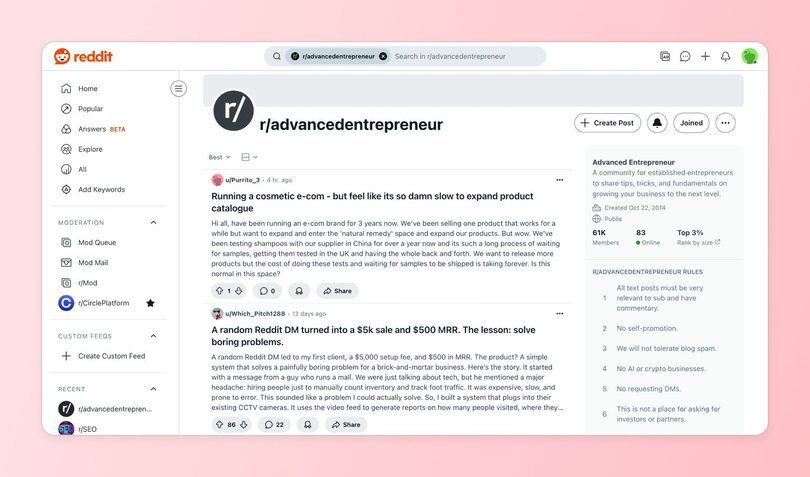
Reddit offers forum-style, topic-based discussions with powerful moderation and a massive built-in audience. It’s ideal for discovery and niche communities. But you don’t own the space or data, branding is minimal, and algorithm shifts can tank reach overnight.
Pricing:
Free for both members and moderators.
Perfect for:
Topic-based communities that live or die on public Q&A and crowd voting.
What makes Reddit different:
- Upvote/downvote system surfaces the most helpful answers first.
- Pseudonymous profiles encourage candid discussion when real names feel risky.
- Millions of existing subreddits make discovery and cross-posting easy.
- Powerful mod tools (AutoMod, keyword filters, user bans) to keep order.
- Native polls, AMAs, and live threads for event-style engagement.
6. The best for free networking (not engagement): LinkedIn Groups
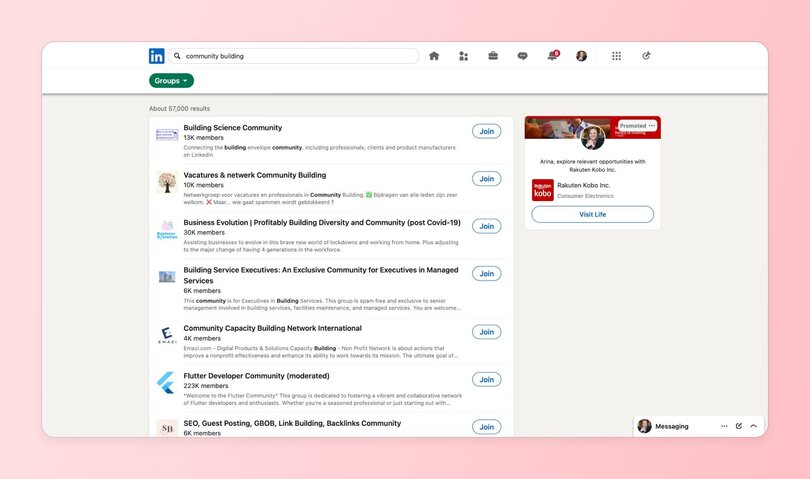
LinkedIn Groups plug your community into a (dare we say, the) professional network where profiles, messaging, and industry discovery are built in. It’s solid for B2B discussion and thought leadership. The drawback is that engagement can be inconsistent, and admin tools are limited compared to dedicated platforms.
Pricing:
Free, included with any LinkedIn account.
Perfect for:
Industry thought-leaders and peer-to-peer networking.
What makes LinkedIn Groups different:
- Members are tied to verifiable professional profiles, reducing spam (but not those “I’m excited to announce…” posts).
- Its algorithm favors expertise-driven posts over viral memes, keeping discussions on topic.
- Built-in targeting lets you invite by company, role, or industry.
- Group-only newsletters and events help you nurture leads without leaving LinkedIn.
- Robust analytics on top contributors and conversation quality.
7. The best for broadcasts (not organization): Telegram
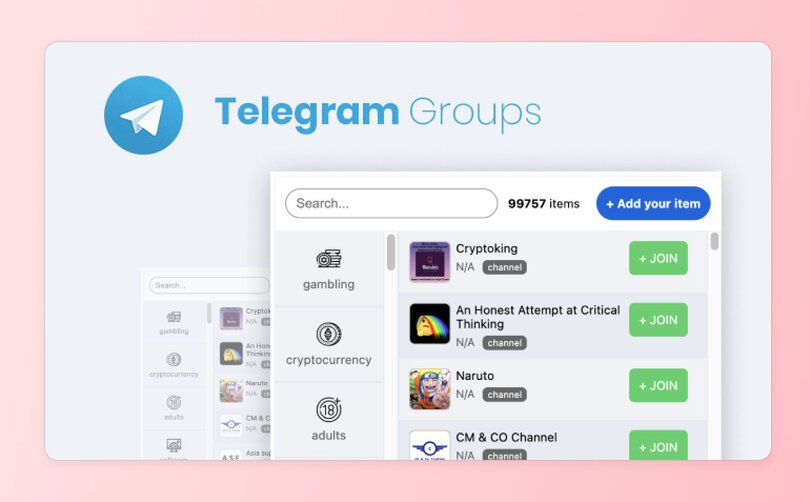
Telegram supports huge groups and broadcast channels with fast messaging, polls, and bots. It’s simple, private, and mobile-first. The trade-off: poor content organization, thin member profiles, and no native paywalls for content.
Pricing:
Free for all features.
Perfect for:
Broadcast-style communities.
What makes Telegram different:
- Supergroups can host up to 200,000 members.
- Separate “Channels” for one-way announcements with unlimited followers.
- Powerful API for bots, polls, and even building your own Telegram app.
- Cross-platform apps with cloud sync and zero size limit on media files.
8. The best messaging app for privacy (not scale): Signal
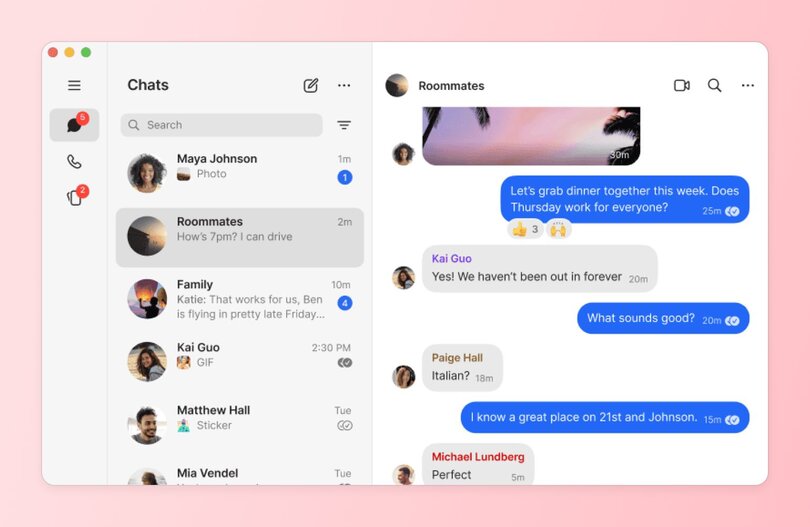
Signal is a privacy-first messaging app that offers end-to-end encryption for both group and one-on-one chats, as well as voice and video calls. It’s great for small, trust-based communities that value confidentiality. Trade-offs: minimal admin/mod tools, weak content organization, limited discoverability, and no native monetization or member profiles.
Pricing:
Completely free; run by a non-profit.
Perfect for:
Activist groups, mental-health circles or anyone who needs maximum confidentiality.
What makes Signal different:
- End-to-end encryption on every message, call and file transfer by default.
- No ads, trackers or data harvesting—Signal collects almost zero metadata.
- Disappearing messages and auto-wipe timers for sensitive chats.
- Open-source codebase audited regularly by security researchers.
9. The best for in-person, event-based communities: Meetup
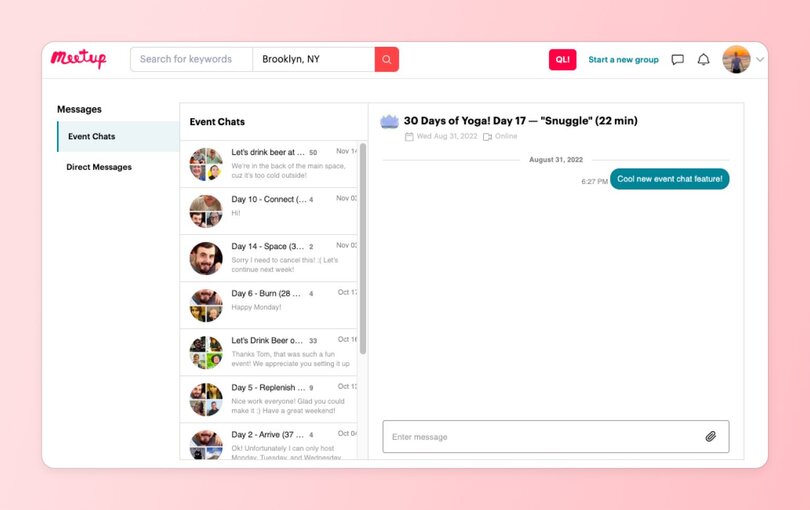
Meetup is built for IRL communities—discovering, scheduling and managing events with RSVPs, waitlists and reminders. It’s ideal for local chapters, recurring meetups and interest-based groups that live or die by attendance. Trade-offs: limited community features beyond events, you don’t own the member data and organiser fees can add up.
Pricing:
The Standard organizer plan starts at $44.99 per month, and the Pro plan starts at $55 per month.
Perfect for:
Local clubs, hobby meet-ups, and professional networking events.
What makes Meetup different:
- Built-in RSVP, wait-list and reminder system that syncs to calendars.
- Discovery engine exposes your events to millions of nearby users.
- Integrated ticketing and paid event options—no extra plugins required.
- Detailed attendee profiles help organizers vet and message guests.
- Mobile organizer app for quick check-in, announcements and photo sharing.
10. The best for simple communities: WhatsApp Groups
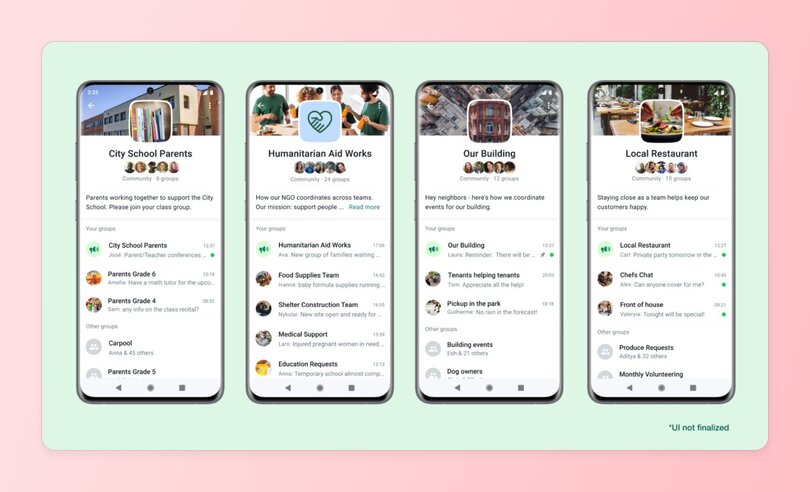
WhatsApp Groups are fast, familiar, and mobile-first, with end-to-end encryption and simple admin controls. They’re ideal for small, close-knit communities that need quick coordination and high engagement. Trade-offs: weak content organization, limited moderation and discoverability, no native monetization, and conversations can vanish in the scroll.
Pricing:
Free.
Perfect for:
Family circles, school parent groups, or small volunteer teams that need low-friction chat. (I should mention hockey parent chats, but if you’re in the ones I’m in, you wouldn’t want to use WhatsApp groups. Practice is always on the same day, this shouldn’t be this hard.)
What makes WhatsApp Communities different:
- Familiar interface. If you can text, you can use WhatsApp Groups.
- Voice and video calls (up to 32 participants) without installing extra software.
- End-to-end encryption on chats, calls and shared media.
- Works seamlessly across iOS, Android, desktop and web clients.
Why these communities switched from Facebook Groups to Circle
1. Sync
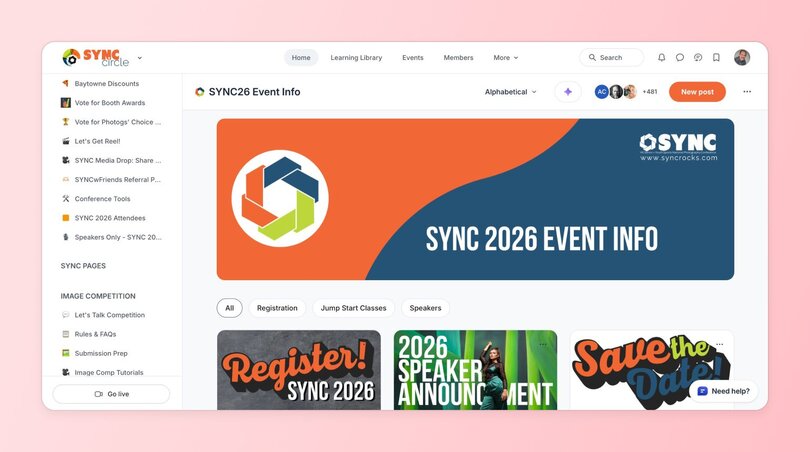
SYNC is a photography conference that wanted a year-round home for its community, better control over announcements, and a clean way to monetize session recordings. They soft-launched Circle to a 35-member mastermind group in October to seed content, then promoted Circle as the “event app” for their conference to reduce friction. On stage, they unveiled the full community, featuring book clubs, deep-dive forums, showcases, and a paid tier (SYNC Circle Plus) with session recordings.
- 😩 Before: Facebook engagement dropped in the off-season, and they needed a home they owned, not an algorithm.
- 🚚 Migration: SYNC built its community on Circle from July to October, soft-launched it to 35 mastermind participants, revealed it at the March conference, and experienced smooth and fast adoption.
- 🎉 After migration: 400 paid members in two months, with strong engagement and conference alumni asking to join.
2. Indiepod
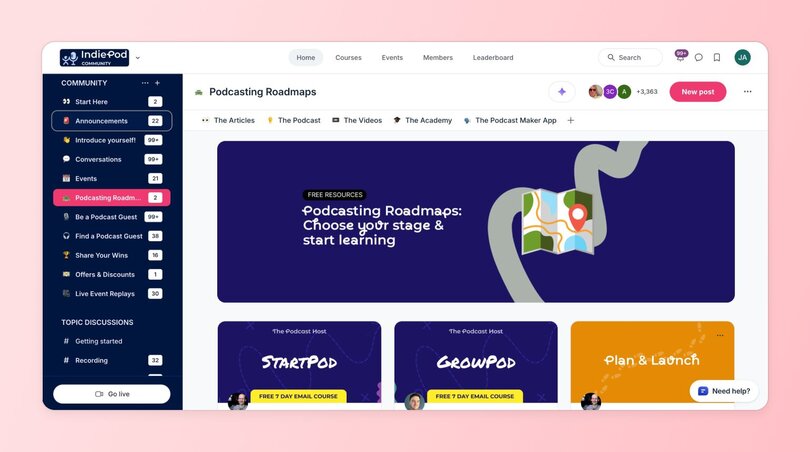
IndiePod moved from a Facebook Group to Circle to create a safer, more purposeful home for podcasters. Facebook Groups had become “post-and-ghost” promo pits and they wanted real relationships to flourish between the community’s members. Circle fit their goals and values, and the team leaned heavily on Circle’s best-practice playbooks to successfully move from Facebook Groups to Circle.
- 😩 Before: IndiePod has 160 members that moved with them from its Facebook Group.
- 🚚 Migration: Following our best practices, IndiePod’s community adoption was smooth.
- 🎉 After migration: Grew to 3,000+ members with strong peer moderation, spam-free vibe, and consistent return visits driven by rituals, events, and replays.
How to choose the right Facebook Groups alternative for your community
Your community matters, whether you’ve spent months or years building it on Facebook Groups. If you’re ready to make a switch (and you’ve read this far, so you probably are), here are five questions to help you make the right decision for your community and members:
- What’s your community goal? Do you want to offer courses, cohorts, or other features not supported by Facebook Groups? How big do you want your community to grow?
- Do you need monetization? Will you be offering paid courses or membership tiers?
- How tech-comfy are you? Moving your members from Facebook Groups to another platform can feel like a risky endeavour. How comfortable are you with setting up more tech-heavy new platforms? (Or do you need something with simple UI, lots of guidance, etc.)
- What’s your budget? Free alternatives like WhatsApp and Signal are great, but you’re sacrificing features and long-term growth opportunities.
⭐ If you’re still unsure, here’s a quick guide to match your goals with the right alternative to Facebook Groups:
| Your priority | Go with... |
|---|---|
| Full-featured community platform to grow your business | Circle |
| Basic, gamified learning | Skool |
| Free, real-time voice/video | Discord |
| Threaded, search-friendly forums | |
| Professional visibility | LinkedIn Groups |
| Massive broadcast audiences | Telegram |
| Maximum privacy | Signal |
| In-person event management | Meetup |
| Small, mobile-first groups | WhatsApp Communities |
Ready to move beyond Facebook Groups?
If you're serious about building a sustainable, profitable community, Facebook Groups will eventually limit your growth. The most successful community builders have already made the switch to dedicated platforms like Circle.
Why wait? Every day you stay on Facebook Groups is another day of:
✖️Lost revenue opportunities
✖️Declining organic reach
✖️Member frustration with distractions
✖️Risk of platform dependency
Take the next step: Join thousands of communities who've successfully migrated from Facebook Groups to Circle. Start your free 14-day trial today!
FAQs about migrating Facebook Groups
What is replacing Facebook Groups?
Many community builders are moving from Facebook Groups to dedicated community platforms like Circle, Mighty Networks, and Skool. These platforms offer better organization, monetization options, and ownership of your data—things Facebook Groups doesn’t provide.
Are Facebook Groups still relevant in 2025?
Facebook Groups still exist, but their relevance has declined. Engagement rates are low, organic reach continues to shrink, and Meta’s frequent algorithm changes make it harder for community builders to succeed. Most serious communities are moving to platforms that offer stability and growth potential.
What is the best replacement for Facebook Groups?
The best replacement depends on your community’s needs. For an all-in-one solution with events, courses, memberships, and branded mobile apps, Circle is a top choice. Other options include Mighty Networks for budget-friendly learning communities or Discord for fast, real-time chat.
How do I migrate from Facebook Groups?
Migrating from Facebook Groups involves exporting your member list, moving key content, and setting up a structured space on your new platform. Circle offers dedicated migration support, including content transfer, member import, and onboarding tools to make the process seamless.
Can I monetize Facebook Groups?
Facebook Groups don’t have built-in monetization tools. You can use workarounds like linking to external payment processors, but this creates friction for members. Platforms like Circle allow you to set up paid memberships, courses, and events directly—without relying on third-party hacks.
What are the risks of using Facebook Groups for business?
Building on Facebook means you don’t fully own your community. Meta controls your data and can shut down or restrict your group at any time. There are also risks from hackers, lack of monetization, and limited customization. Using a dedicated community platform reduces those risks and gives you more control.